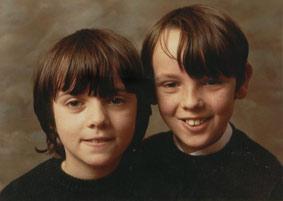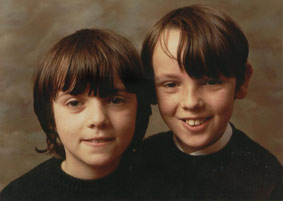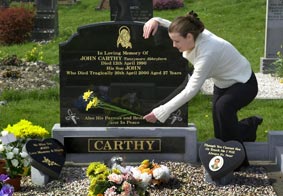'I had to keep going for John'

Having been vindicated by the Barr report, John Carthy's sister, Marie, is writing a book about him and is suing the Garda Commissioner for his killing in Abbeylara. She talks to Justine McCarthy
No trace of the house remains. The rooms that once breathed the comings and goings, the joys and hurts, the disappointments and delights and the humdrum routines of the family are gone forever. The kitchen where the brother and sister ate their breakfast before setting out together, hand in hand, for their first day at school is no more. The bedroom, where the fit, labouring father employed by Bord na Móna started to succumb to heart disease, no longer exists. Nothing is left of the damp walls and the buckling ceiling so graphically and dispassionately itemised by lawyers at the inquest in Longford. There is no vestige of that final scene of mayhem – the telephone ripped from the wall, the smashed cap stone on the gatepost, the spent cartridges scattered on the floor – after John left home for the last time. Easter week in the year 2000.
The three-bedroom abode that John Carthy died trying to preserve has been demolished. "It was the house he grew up in. All happy memories... normal childhood," his sister, Marie, attempts to explain his desperate attachment to the house. "He wanted to keep the family home."
Beside the newly grassed spot where it had stood since 1906 is a bright, modern house, the one Longford County Council promised to build in return for the site of the old one. It is here that his widowed mother, Rose, lives alone with her tragic, cacophonous, disjointed memories.
One warm, sun-spilled day last August, a uniformed garda she did not know stood on the doorstep of the pristine new house and handed Rose a sealed envelope. It contained a type-written letter saying sorry for her son's killing. The signature at the bottom of the page was the Garda Commissioner's.
"It apologised for what happened and said the recommendations in the Barr tribunal report were going to be implemented, though that hasn't been done," says Marie. "She was there on her own when she got the letter. I was on my way to see her. She was upset when I got there. She got a fright. She had been crying and that. It was as if they had been forced into writing it."
The apology came six years and four months after the Garda's Emergency Response Unit (ERU) shot John Carthy dead at the age of 27 on the roadway outside his old home in Toneymore, Abbeylara, to the watching enthralment of the nation. It was a very public killing. For 25 hours, while John had remained in the house, sporadically firing his licensed shotgun, RTÉ radio and television had provided regular news bulletins on the 'siege' at Abbeylara. Citizens in cars and on buses, in cafes and shops, in tractors and offices and factories, in their kitchens and their living rooms awaited these up-dates with fascinated dread. It was a deeply personal tragedy unfolding in the amphitheatre of national drama.
The commissioner's unannounced and unheralded letter of contrition, coming so long after John's death and a month after the Barr report's condemnations of the Garda were published, conveyed a clandestine insincerity. Both the Taoiseach and the Minister for Justice had quickly apologised to the Carthy family once the report came out – cataloguing critical errors, negligence and failure by gardaí to plan for an uncontrolled-exit strategy – but the commissioner, Noel Conroy, had persisted in defending his force.
Marie Carthy believes that an apology would never have emanated from him had Michael McDowell not declared in the media that one would be forthcoming in due course. She says she and her mother – the surviving half of the four-person family – accept the commissioner's apology but that she, Marie, would have preferred if the Barr report had been published before the Dáil's summer recess and she still wants the Garda to say sorry to them in public. Just as John died in public.
They had been as close as twins, seemingly forever. Born within 14 months of each other, growing up in the sparsely-populated midlands countryside with no other brother or sister, they stuck together. It was John and Marie, always. He, the older one, did not go to school until the age of six so that they could go together for their first day at St Bernard's national school in Abbeylara. For the first year, they sat side by side in the classroom and later, when they were split into separate classes, they still shared the five-minute walk between school and home, every morning and every afternoon.
After John sat his Leaving Cert in 1991 and transferred from Granard to Agriculture College in Warrenstown, Co Meath, distance did not alienate them. If anything, they grew closer.
It was while in Warrenstown that John began showing signs of depression, following his father's death from heart failure on Holy Thursday 1990.
"He worked with Dad. It was a typical father and son, going to football matches, that kind of thing," recalls Marie, who was 16 when her father died. "He'd been sick for a year-and-a-half, in and out of hospital. After he died, John was down in himself."
John was diagnosed with bipolar affective disorder and was prescribed anti-depressants and lithium, a mood stabiliser. He developed a curiosity about his condition and a sense of fellowship with other sufferers. Marie often accompanied him to Aware meetings and public lectures on depression.
"He always looked after me and he'd always confide in me when he was feeling unwell," she says. "He would ring me every day. There was a stigma about depression and there still is but it's less now. He'd be glad about that."
It was Marie who had phoned his psychiatrist, Dr David Shanley, to book an appointment for 2pm on 20 April 2000. But John never kept the appointment because that was the day he died. Marie is convinced her brother would be alive still if gardaí had permitted her to talk to him on the home phone before he unplugged it and fatally left the house. When gardaí denied her access to the phone (it was postulated at the tribunal hearings that attempting to call John could have have endangered her life) and the signal for the mobile phone proved too weak to make contact, she never again got to hear the voice of the brother who had phoned her every day. How often she must have imagined how that conversation might have gone. What would she have said to him?
"I probably would have told him not to be worrying and not to panic," she replies with tears in her eyes.
Both the inquest into John's death in 2000 and the Barr tribunal hearings were given sworn evidence that Marie Carthy was intoxicated at the siege scene, having been driven there in a Garda car from Galway, where she was working at the time. It was one of many false allegations made against her and her dead brother. Another spurious rumour had it that she and John had fallen out over land left to him in a will. It is as much to redress the inaccurate depiction of her brother since his death as to rescue his personality from the snowstorm of forensic minutiae that she is writing a book, Abbeylara: the Life and Tragic Death of John Carthy, due to be published on his seventh anniversary next April.
"It was like a nightmare," she says, looking back over the past six years. "My name was constantly blackened all over the place. It was bad enough having to clear John's name without having to clear mine too. There were lots of things said, like the guards saying I was drunk and that was why I wasn't allowed speak to him.
"They said John wanted to die. If he wanted to he'd had every opportunity to die in the last 10 years when he had depression. I had to keep going for John and for all the other people suffering from depression."
She remembers preparing for the first press conference a few days after John's death. She was staying in the nearby Park House Hotel, her home cordoned off as an official crime scene, and gardaí coming to taking statements from her and her mother. "We didn't know what we were facing then," she says.
She remembers, too, when the Oireachtas justice committee's attempt to investigate Abbeylara was scuppered 19 months after John died by a High Court order prohibiting its inquiry. In its judgment on the challenge mounted by 36 gardaí, the court ruled that such an inquiry was "liable to result in findings of fact or expression of opinion adverse to the good name, reputation and/or livelihood" of non-elected people.
"That was hard. It was probably the hardest time," she says, adding that her visits to John's grave gave her strength to continue her campaign to expose what happened in Abbeylara. "If it was the other way around, he'd have done it for me. It's been very stressful. Some of the cross-examining I had to endure at the tribunal, it was as if I was in the wrong. Some of the questions were very aggressive. Even being in the same room as the men who shot John... It's changed me," she says. "I look at things differently now. I wouldn't take anything at face value."
Her physical transformation is striking. Gone are the casual country clothes and fly-away hair. She wears tailored monochrome trouser suits these days. Suits that mean business, with black-framed glasses and a sharp hair-cut to match. By her side is Patrick, her partner, whose privacy she is keen to protect. He does not interject but she glances at him every so often for moral support, never more so than when she struggles to describe her brother and the words choke on her tears.
One wonders if she is ready to cope with the emotional grinder of the High Court, where she and her mother have lodged proceedings for damages against the Garda Commissioner, the Minister for Justice and the Attorney General.
"It was a tough decision," she agrees, "because it means we can't get on with our lives, but it will always be there. Our lives will probably never be the same again. I wouldn't be worried about proving our case [in court]. It's plain to be seen in Judge Barr's report that mistakes were made. Judge Barr showed great respect to our family and to John's friends. He was very thorough.
"We have been vindicated. We were put through so much stress. The guards never admitted the way we lost John. I do know that not all guards are the same. I have a friend a guard. She's from Galway. As regards Michael Jackson [the ERU sergeant and siege negotiator who fired the non-lethal opening shots at John], he only fired the first two shots. He has to live with that and he has a family."
When she pointedly fails to mention Sergeant Aidan McCabe, who fired the third and the fatal fourth shots, and is asked if she can muster any feelings of sympathy for him, she answers: "There was no need for that shot. It shouldn't have come to that. That's what it all boils down to."
Marie Carthy is a reticent woman. Adopting a public role did not come naturally to her but she did it, withstanding vilification and innuendo, out of obligation to her brother. More than six years after his death, the unshakeable bond that tied them remains indestructible, as she illustrates with shocking candour.
Claiming that the presence of gardaí outside their home in Toneymore was the single cataclysmic mistake of the stand-off, she recalls the burning of a goat mascot in September 1999, after it had been erected on the village green to celebrate Abbeylara's qualification for the county football final. John was treated as the only suspect and he was questioned about the incident in the garda station. Barr concluded in his report that it was "highly probable" John was subjected to physical abuse there.
"He got a lot of slagging in the village afterwards," Marie remembers. "John knew the two boys who burned the mascot and he told me who they were. He told me not to tell anyone. I respected that. Those two boys have still never admitted they did it. I see one of them regularly. I've never spoken to them about it and I won't say their names because John asked me not to. After that, John feared the guards. He didn't trust them. Having them outside the house was the first big mistake."
The future is compartmentalised for the surviving members of the Carthy family. Marie has finished the first year of a four-year counselling degree at NUI Maynooth and is hoping to specialise in counselling sufferers of depression. Rose, according to her daughter, "doesn't say much" and is "as happy as she can be". The High Court looms for both of them, battle-wearied and world-wearied after six years of fighting for justice. So, when Marie laughs at the end of the interview having fought – and sometimes failed – to keep her grief in check, the sound of her laughter is as unexpected as lark-song at midnight.
What prompts it is one final question.
Do you think John would be proud of you?
"He'd better be."
And she laughs, as if he is there in the room with her, sharing the joke.
